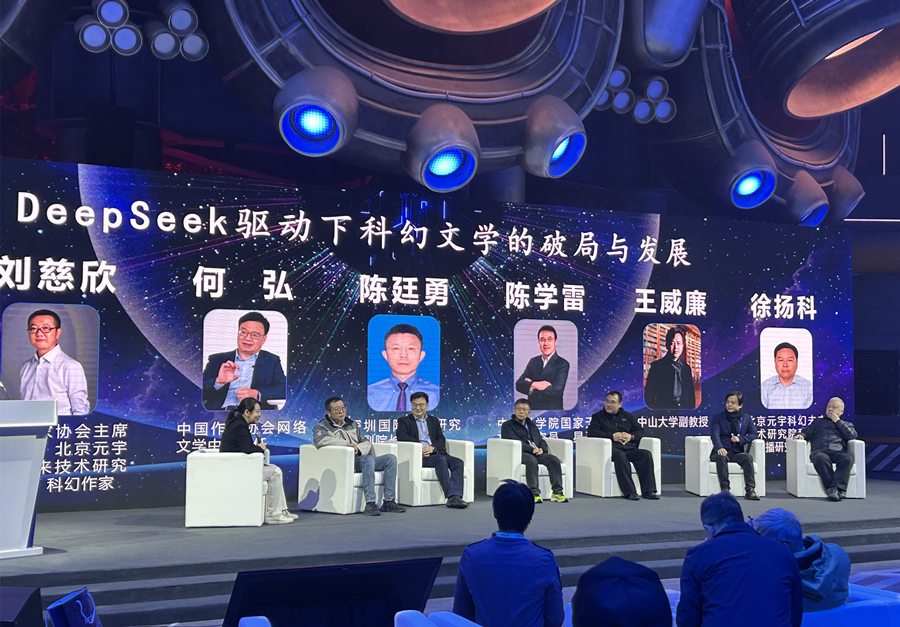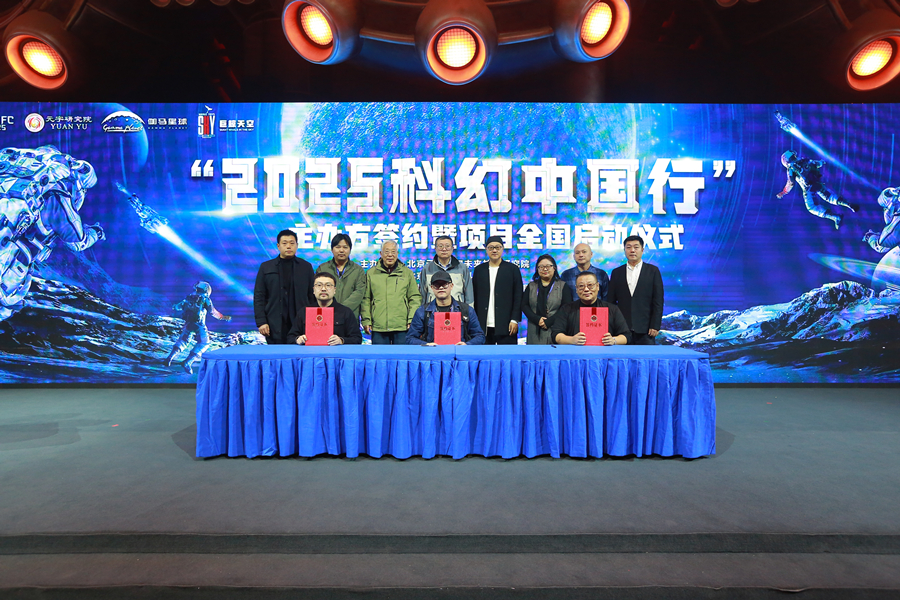
 0 Comment(s)
0 Comment(s) Print
Print E-mail China.org.cn, March 31, 2025
E-mail China.org.cn, March 31, 2025
Scientists and writers gathered Saturday at a forum during the 2025 China Science Fiction Convention (CSFC 2025) in Beijing to discuss how cutting-edge technologies are transforming human creativity and literary expression.

Panelists exchange ideas at the Scientific Innovation and Science Fiction Writing Forum during the 2025 China Science Fiction Convention in Beijing, March 29, 2025. [Photo/China.org.cn]
"The rapid development of AI could redefine literature creation, appreciation and our creative work methods as writers," prominent Chinese sci-fi author Liu Cixin said at the Scientific Innovation and Science Fiction Writing Forum. "As sci-fi writers, we feel technology's power and disruption most acutely. Our first task now is to stop comforting ourselves, confront this upheaval honestly, and pioneer new possibilities for our future."
"The Three-Body Problem" author once believed AI couldn't replace humans, agreeing it merely reshuffled data into emotionless outputs. However, he later realized human creativity operates similarly — processing data from reading and experience, just at slower speeds. AI simply outperforms humans in both data processing scale and logical reasoning speed.
"In the future, we could simply have AI write novels to entertain us. If we don't like one, we can just ask for another. But then — in this reality — what becomes of us writers? I honestly don't yet have an answer," he said.
Despite this uncertainty, Liu affirmed his enduring love for unaided writing, describing it as "the profound joy of independent, personal creation."
He Hong, director of the Network Literature Center of the Chinese Writers Association, reflected on literature's role in human experience and AI's current limitations. He observed that existing AI systems merely mediate human thought through interaction without possessing true consciousness. Hong suggested that humanity would only need to reconsider its understanding of life itself if AI ever develops genuine self-awareness.
"AI could greatly liberate our creative productivity in writing," he said. "Like all tools before it - consider how we invented cars, trains and airplanes not to compete with them, but to ride them. Similarly, AI currently serves as our tool. While it will undoubtedly eliminate much formulaic and repetitive creative work, I believe AI will significantly enhance our creative process."
Wang Weilian, associate professor in the Department of Chinese Language and Literature at Sun Yat-sen University, said science fiction uniquely bridges the gap between humanities, sciences and engineering while providing space for imagination. "AI, interestingly, has now become the unifying force that reintegrates these fragmented fields," he said.
"In this age of AI, we must fundamentally reconsider what intelligence means," Wang noted. "Through this new lens, I see civilization's rebirth unfolding — an era of reintegration. The liberal arts have become a shared pursuit, redefining humanity's self-conception, civilizational narratives, and our relationship with the world. Rather than discard them, we must reimagine them: building new systems for knowledge creation and imaginative cultivation."
Chen Tingyong, vice president of the Shenzhen International Quantum Academy, said functional quantum computers could enable breakthroughs like personalized cancer treatments. He noted that quantum mechanics inspires science fiction through concepts like parallel realities and quantum tunneling's teleportation effects. Conversely, he added that sci-fi works also inspire researchers, teachers, and students in this field.
Chen Xuelei, a researcher at the National Astronomical Observatories of the Chinese Academy of Sciences, acknowledged he didn't take alien theories seriously in his scientific work until Professor Nan Rendong, the late chief scientist of China's Five-hundred-meter Aperture Spherical Radio Telescope (FAST), shared research documents on extraterrestrial detection methods.
"After reviewing the materials Nan collected, I realized my thinking had been constrained — why shouldn't we search for extraterrestrials?" he said. "The premise of 'The Three-Body Problem,' while not necessarily scientifically accurate, serves as a wake-up call. The act of searching itself holds profound meaning."
Xu Yangke, director of the Popular Science and Science Fiction Communication Research Institute at Beijing Yuanyu Science Fiction and Future Technology Research Institute, said AI presents dual challenges. He explained that AI's rapid development requires updates to copyright laws, while tools like DeepSeek enhance productivity through faster translation and editorial workflows. Xu noted that creators now need interdisciplinary skills to surpass machine capabilities, adding that this transition will likely eliminate subpar works while fostering innovation in both science fiction and popular science communication.

The "Science Fiction China Tour 2025" initiative is launched at the Scientific Innovation and Science Fiction Writing Forum during CSFC 2025 in Beijing, March 29, 2025. [Photo courtesy of the Beijing Yuanyu Science Fiction and Future Technology Research Institute]
During the forum, writers Zhu Yuqing and Chao Xia introduced their new sci-fi books "Times Change and Stars Shift" and "Young Adventure Heroes."
Organizer Beijing Yuanyu also announced a new Scientific Creative Writing and Communication Research Center in partnership with the China University of Petroleum and signed agreements with various enterprises for future collaboration.
Go to Forum >>0 Comment(s)